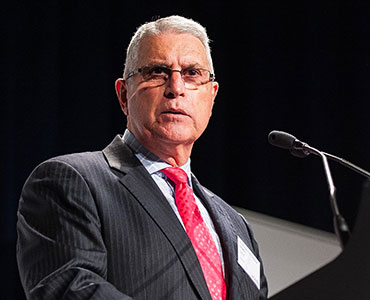CEDA releases Economic and Political Overview report
LIFTING productivity must become a priority in 2015 or gains in our standard of living could be significantly eroded as the terms of trade continue to decline and our population ages, according to CEDA’s 2015 Economic and Political Overview released in Sydney on February 13.
Releasing the annual publication, CEDA chief executive Stephen Martin said there were positive signs the business community was taking action to lift productivity but there needed to be greater focus on innovation and investment in people. 
“Economic reform will also be vital to keep our economy healthy as terms of trade continue to fall post the mining boom,” Professor Martin said.
“On the political front, key issues will also result from our changing economic fortunes with rising unemployment and underemployment, particularly youth unemployment, and industrial relations.”
Other key economic forecasts anticipate:
- GDP growth will remain below average in 2015 before returning to around average in 2016;
- the rate of decline in resources investment is expected to increase this year;
- housing construction’s contribution to growth will fade in 2015 without further rises in building approvals; and
- a sustained pick-up in household spending growth is needed this year to support the non-mining sectors.
In addition to the economic and political forecasts, this year’s publication also looks at finance and funding of Australia’s future growth and funding social equity.
“As debates continue on access to healthcare and education and rising unemployment in particular youth unemployment, social equity is likely to become a major issue in 2015,” Prof. Martin said.
“Analysis provided in the CEDA report highlights areas where changes are needed such as Newstart, education and health.
“Importantly it also provides areas where savings could be made in the Federal Budget to help fund the changes needed including:
- changing the Pharmaceuticals Benefits Scheme to reduce ineffective subsidies and over-pricing of drugs, potentially saving billions of dollars;
- reducing tax breaks for superannuation; and
- increasing the preservation age for access to superannuation to encourage people to stay in the workforce longer.”
Prof. Martin said financing in Australia has been examined because this is likely to significantly change in the coming decades, particularly with the growing pools of funds managed through superannuation and likely increasing foreign capital flows, in particular from China
“It is important that Australia is on the front foot about how these changes will impact business more generally but also financing for major projects such as infrastructure,” he said.
“Unfortunately the political instability currently being experienced federally, and at a state level through changes of government, is impacting on debates and implementation of reforms and major projects we need to keep our economy on track.
“It is also concerning that there has been a lack of appetite for national debate on areas of reform that need to be examined now such as broadening or increasing the GST, corporate tax loopholes and Federal/State fiscal arrangements.”
CEDA’s EPO, which has been produced annually for more than 30 years, provides analysis and discussion from leading economic, political and academic analysts on key issues that will have a significant impact on Australia in 2015.
CEDA 2015 EPO contributing authors are:
- Economic outlook – Warren Hogan, chief economist, ANZ; Justin Fabo, senior economist, ANZ.
- Political outlook – Michele Levine, chief executive officer, Roy Morgan Research.
- Funding social equity – Cassandra Goldie, chief executive officer, Australian Council of Social Service.
- Finance and funding – Rodney Maddock, adjunct professor, Monash University; vice-chancellor's fellow, Victoria University.
The EPO was launched in Sydney through a keynote address by NSW Premier Mike Baird.
Other speakers at the launch event include Jane Halton, secretary, Federal Department of Finance and Warren Hogan, chief economist ANZ.
The launch event is to be followed by a series of events being held in Brisbane, Hobart, Adelaide, Canberra, Townsville, Melbourne, Perth and Darwin.
* CEDA - the Committee for Economic Development of Australia - is a national, independent, member-based organisation providing thought leadership and policy perspectives on the economic and social issues affecting Australia. The organisation prides itself in its "rigorous and evidence-based research agenda" and by staging forums and events that deliver lively debate and critical perspectives.
CEDA's membership includes more than 700 of Australia's leading businesses and organisations, and leaders from a wide cross-section of industries and academia. An independent not-for-profit organisation, it was founded in 1960 by leading Australian economist Sir Douglas Copland. Funding comes from membership fees, events, research grants and sponsorship.
ends

